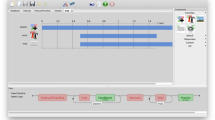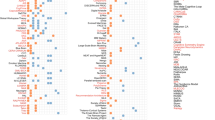Abstract
In this paper, I offer a new argument for the perceptual rationality thesis: the claim that perceptual experiences themselves can be rational or irrational. In her book The Rationality of Perception, Susanna Siegel has offered several intertwined arguments for this same thesis, and, as you will see, one of Siegel’s arguments is what inspires my own. However, I will suggest that the new argument is significantly better-supported than Siegel’s original argument.
Similar content being viewed by others
Notes
Ibid, p. 17.
For these objections, see the excellent contributions of Ori Beck and Alison Springle, respectively, to Siegel et al. (2018).
This is half of a thesis that Siegel refers to as the Rationality of Perception. The other half of that thesis is that “the processes by which [perceptual experiences] arise can be rational or irrational” (Siegel 2017, p. 15).
Siegel (2017, p. 174).
See for example Siegel (2017, p. 11).
For example, in one section, Siegel “develops the idea that a mental state has a rational standing because it belongs to the subject’s outlook” (2017, p. 38; note that Siegel is here describing what she is doing on pp. 41–51).
See Siegel (2017, pp. 117–119).
There are other cases throughout the book in which Siegel mentions empirical results without taking any stand on how they are to be interpreted. See for example Siegel (2017, p. 153).
See especially Siegel (2017, ch. 3).
For example, phenomenal conservatives Carruthers and Veillet assert that “A property is phenomenal … only if it gives rise to an explanatory gap” (2011, p. 45).
See Mandelbaum (2018, p. 268).
See Mandelbaum (2018, p. 275).
See Siegel (2017, p. 6).
Siegel repeats variants of the unification consideration several times. See for example Siegel (2017, pp. 127 and 169).
References
Alston, W. (1999). Back to the theory of appearing. Philosophical Perspectives 13, 181–203.
Bayne, T. (2009). Perception and the reach of phenomenal content. The Philosophical Quarterly, 59(236), 385–404.
Block, N. (2014). Seeing-as in the light of vision science. Philosophy and Phenomenological Research, 89(1), 560–572.
Brewer, B. (1999.) Perception and reason. Oxford: Oxford University Press.
Brewer, B. (2011). Perception and its objects. Oxford: Oxford University Press.
Brewer, B. (2018). Review of The Rationality of Perception, by S. Siegel. Journal of Philosophy, 2018, 106–110.
Burge, T. (2010). Origins of objectivity. Oxford: Clarendon Press.
Byrne, A. (2009). Experience and content. The Philosophical Quarterly, 59(236), 429–451.
Carruthers, P., & Veillet, B. (2011). The case against cognitive phenomenology. In T. Bayne & M. Montague (Eds.), Cognitive phenomenology (pp. 35–56). Oxford: Oxford University Press.
Evans, G. (1982). The varieties of reference. New York: Oxford University Press.
Fish, W. (2009). Perception, hallucination, and illusion. Oxford: Oxford University Press.
Fish, W. (2013). High-level properties and visual experience. Philosophical Studies, 162, 43–55.
Heck, R. (2000). Nonconceptual content and the space of reasons. Philosophical Review, 109, 483–523.
Mandelbaum, E. (2018). Seeing and conceptualizing: modularity and the shallow contents of perception. Philosophy and Phenomenological Research, 97(2), 267–283.
Masrour, F. (2011). Is perceptual phenomenology thin? Philosophy and Phenomenological Research, 83(2), 366–397.
McDowell, J. (1994). Mind and world. Cambridge: Harvard University Press.
Millar, A. (2008). Perceptual-recognitional abilities and perceptual knowledge. In A. Haddock & F. Macpherson (Eds.), Disjunctivism: perception, action, knowledge (pp. 311–329). Oxford: Oxford University Press.
Millar, A. (2018). Can perceptual experiences be rational? Mind, 127(505), 251–263.
Potter, M., Wyble, B., Hagmann, C., & McCourt, E. (2014). Detecting meaning in RSVP at 13 ms per picture. Attention, Perception, & Psychophysics, 76(2), 270–279.
Price, R. (2009). Aspect-switching and visual phenomenal character. The Philosophical Quarterly, 59(236), 508–518.
Siegel, S. (2006). Which properties are represented in perception? In T. Gendler & J. Hawthorne (Eds.), Perceptual experience (pp. 481–503). New York: Oxford University Press.
Siegel, S. (2010). The contents of visual experience. Oxford: Oxford University Press.
Siegel, S. (2017). The rationality of perception. Oxford: Oxford University Press.
Siegel, S., Beck, O., Chirimuuta, M., Rosenhagen, R., Smithies, D., & Springle, A. (2018). Discussion of Susanna Siegel’s ‘Can perceptual experiences be rational?’. Analytic Philosophy, 59(1), 175–190.
Acknowledgements
I am especially grateful to Ori Beck, who gave me careful feedback on a draft of this paper, and to my undergraduate student Farheen Asim, with whom I had many extended and illuminating conversations about Siegel’s book. I have also benefitted from discussions in my seminar Perception with undergraduate students Jessica Chang, Siddharth Chatterjee, Zhi Heng Chia, Joseph Han, Dara Hanson, Elaine Li, Allison Love, Yi Ming Ng, Yong Li Ng, Gena Soh, Joshua Tan, Xianda Wen, Cassandra Woo, and Keith Yee.
Funding
Yale-NUS College and the Singapore Ministry of Education.
Author information
Authors and Affiliations
Corresponding author
Additional information
Publisher’s Note
Springer Nature remains neutral with regard to jurisdictional claims in published maps and institutional affiliations.
Rights and permissions
About this article
Cite this article
Mehta, N. A New Argument for the Rationality of Perception. Acta Anal 36, 393–408 (2021). https://doi.org/10.1007/s12136-020-00451-z
Received:
Accepted:
Published:
Issue Date:
DOI: https://doi.org/10.1007/s12136-020-00451-z




